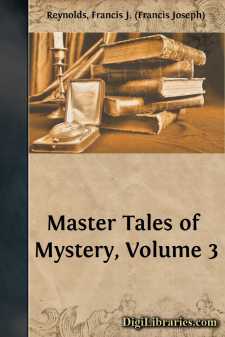Categories
- Antiques & Collectibles 13
- Architecture 36
- Art 48
- Bibles 22
- Biography & Autobiography 813
- Body, Mind & Spirit 142
- Business & Economics 28
- Children's Books 17
- Children's Fiction 14
- Computers 4
- Cooking 94
- Crafts & Hobbies 4
- Drama 346
- Education 46
- Family & Relationships 57
- Fiction 11829
- Games 19
- Gardening 17
- Health & Fitness 34
- History 1377
- House & Home 1
- Humor 147
- Juvenile Fiction 1873
- Juvenile Nonfiction 202
- Language Arts & Disciplines 88
- Law 16
- Literary Collections 686
- Literary Criticism 179
- Mathematics 13
- Medical 41
- Music 40
- Nature 179
- Non-Classifiable 1768
- Performing Arts 7
- Periodicals 1453
- Philosophy 64
- Photography 2
- Poetry 896
- Political Science 203
- Psychology 42
- Reference 154
- Religion 513
- Science 126
- Self-Help 84
- Social Science 81
- Sports & Recreation 34
- Study Aids 3
- Technology & Engineering 59
- Transportation 23
- Travel 463
- True Crime 29
Master Tales of Mystery, Volume 3
Description:
Excerpt
I
Kennedy's suit-case was lying open on the bed, and he was literally throwing things into it from his chiffonier, as I entered after a hurried trip up-town from the Star office in response to an urgent message from him.
"Come, Walter," he cried, hastily stuffing in a package of clean laundry without taking off the wrapping-paper, "I've got your suit-case out. Pack up whatever you can in five minutes. We must take the six o'clock train for Danbridge."
I did not wait to hear any more. The mere mention of the name of the quaint and quiet little Connecticut town was sufficient. For Danbridge was on everybody's lips at that time. It was the scene of the now famous Danbridge poisoning case—a brutal case in which the pretty little actress, Vera Lytton, had been the victim.
"I've been retained by Senator Adrian Willard," he called from his room, as I was busy packing in mine. "The Willard family believe that that young Dr. Dixon is the victim of a conspiracy—or at least Alma Willard does, which comes to the same thing, and—well, the senator called me up on long-distance and offered me anything I would name in reason to take the case. Are you ready? Come on, then. We've simply got to make that train."
As we settled ourselves in the smoking-compartment of the Pullman, which for some reason or other we had to ourselves, Kennedy spoke again for the first time since our frantic dash across the city to catch the train.
"Now let us see, Walter," he began. "We've both read a good deal about this case in the papers. Let's try to get our knowledge in an orderly shape before we tackle the actual case itself."
"Ever been in Danbridge?" I asked.
"Never," he replied. "What sort of place is it?"
"Mighty interesting," I answered; "a combination of old New England and new, of ancestors and factories, of wealth and poverty, and above all it is interesting for its colony of New-Yorkers—what shall I call it?—a literary-artistic-musical combination, I guess."
"Yes," he resumed. "I thought as much. Vera Lytton belonged to the colony. A very talented girl, too—you remember her in 'The Taming of the New Woman' last season? Well, to get back to the facts as we know them at present.
"Here is a girl with a brilliant future on the stage discovered by her friend, Mrs. Boncour, in convulsions—practically insensible—with a bottle of headache-powder and a jar of ammonia on her dressing-table. Mrs. Boncour sends the maid for the nearest doctor, who happens to be a Dr. Waterworth. Meanwhile she tries to restore Miss Lytton, but with no result. She smells the ammonia and then just tastes the headache-powder, a very foolish thing to do, for by the time Dr. Waterworth arrives he has two patients."
"No," I corrected, "only one, for Miss Lytton was dead when he arrived, according to his latest statement."
"Very well, then—one. He arrives, Mrs. Boncour is ill, the maid knows nothing at all about it, and Vera Lytton is dead. He, too, smells the ammonia, tastes the headache-powder—just the merest trace—and then he has two patients, one of them himself....


